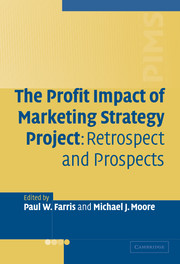Book contents
- Frontmatter
- Contents
- List of figures
- List of tables
- Notes on contributors
- Acknowledgments
- Introduction
- 1 The PIMS project: vision, achievements, and scope of the data
- 2 Putting PIMS into perspective: enduring contributions to strategic questions
- 3 PIMS and COMPUSTAT data: different horses for the same course?
- 4 Order of market entry: empirical results from the PIMS data and future research topics
- 5 Does innovativeness enhance new product success? Insights from a meta-analysis of the evidence
- 6 Marketing costs and prices: an expanded view
- 7 The model by Phillips, Chang, and Buzzell revisited – the effects of unobservable variables
- 8 Causation and components in market share–performance models: the role of identities
- 9 Cargo cult econometrics: specification testing in simultaneous equation marketing models
- 10 PIMS and the market share effect: biased evidence versus fuzzy evidence
- 11 PIMS in the new millennium: how PIMS might be different tomorrow
- Select bibliography
- Author index
- Subject index
- References
3 - PIMS and COMPUSTAT data: different horses for the same course?
Published online by Cambridge University Press: 22 September 2009
- Frontmatter
- Contents
- List of figures
- List of tables
- Notes on contributors
- Acknowledgments
- Introduction
- 1 The PIMS project: vision, achievements, and scope of the data
- 2 Putting PIMS into perspective: enduring contributions to strategic questions
- 3 PIMS and COMPUSTAT data: different horses for the same course?
- 4 Order of market entry: empirical results from the PIMS data and future research topics
- 5 Does innovativeness enhance new product success? Insights from a meta-analysis of the evidence
- 6 Marketing costs and prices: an expanded view
- 7 The model by Phillips, Chang, and Buzzell revisited – the effects of unobservable variables
- 8 Causation and components in market share–performance models: the role of identities
- 9 Cargo cult econometrics: specification testing in simultaneous equation marketing models
- 10 PIMS and the market share effect: biased evidence versus fuzzy evidence
- 11 PIMS in the new millennium: how PIMS might be different tomorrow
- Select bibliography
- Author index
- Subject index
- References
Summary
For researchers investigating questions related to marketing strategy and financial performance, there are few databases that are, in any way, comparable to PIMS. However, COMPUSTAT is one database that researchers have used frequently to address such questions. Other databases that provide limited additional points of comparison are that of the Inland Revenue Service (IRS) and the Federal Trade Commission (FTC) Line of Business data. In this chapter we will provide some comparisons between PIMS and COMPUSTAT data.
From the beginning, researchers were impressed by the “overwhelming superiority of PIMS data to other sources in quantity, number of measured variables, timeliness, [and the] conscientious attempt to minimize potential sources of input error” (Anderson and Paine 1978). Of course, the “timeliness” of the PIMS data is no longer a strong point and, since 1990 or so, publications of empirical findings based on the PIMS data have appeared far less frequently in major marketing and strategy journals – published articles have declined along with the size and currency of the data.
On the other hand, publications based on COMPUSTAT data are appearing with increasing frequency in marketing journals. Further, many of the issues addressed by researchers using COMPUSTAT are similar to those addressed with analyses of the PIMS data. For example, both COMPUSTAT and PIMS data have been used to study: relationships of market share, firm size, and power to profits; determinants of marketing cost ratios and media budgets; and returns from R&D and new products activities, and patents.
Information
- Type
- Chapter
- Information
- The Profit Impact of Marketing Strategy ProjectRetrospect and Prospects, pp. 41 - 72Publisher: Cambridge University PressPrint publication year: 2004
References
Accessibility standard: Unknown
Why this information is here
This section outlines the accessibility features of this content - including support for screen readers, full keyboard navigation and high-contrast display options. This may not be relevant for you.Accessibility Information
- 1
- Cited by
